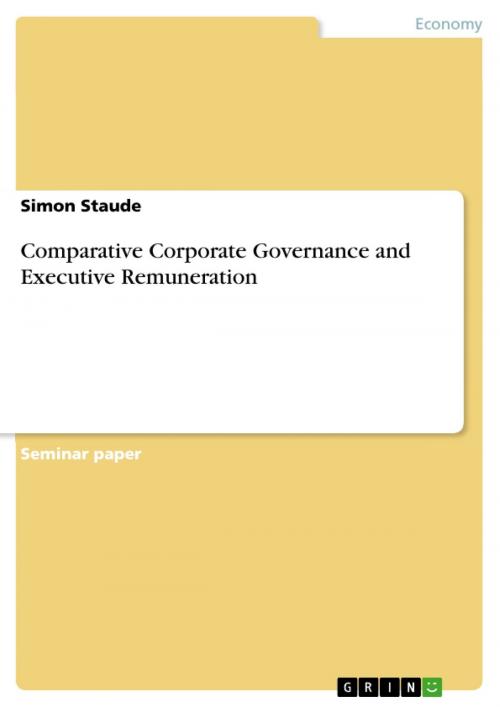Comparative Corporate Governance and Executive Remuneration
Business & Finance, Finance & Investing, Finance| Author: | Simon Staude | ISBN: | 9783668043138 |
| Publisher: | GRIN Verlag | Publication: | September 10, 2015 |
| Imprint: | GRIN Verlag | Language: | English |
| Author: | Simon Staude |
| ISBN: | 9783668043138 |
| Publisher: | GRIN Verlag |
| Publication: | September 10, 2015 |
| Imprint: | GRIN Verlag |
| Language: | English |
Seminar paper from the year 2014 in the subject Business economics - Investment and Finance, , language: English, abstract: The justification of a company having a remuneration committee (hereinafter 'RemCo') is simple and based on the 'agency theory' whereby directors are employed to act as proxies for shareholders and manage a companies' business on their behalf. However, their powers allow them to manage the business in a manner, which facilitates their own interests. Excessive remuneration and bonus schemes are probably the most controversial outcomes which may be considered as a result of this principle. The UK Corporate Governance Code (hereinafter 'the Code') has tried to deal with this issue, providing principles to establish an appropriate level of remuneration for directors and to align this remuneration with the interest of the shareholders. However, the salaries of CEOs of FTSE100 companies have increased significantly over the last ten years. This is supported by a recent Manifest survey which shows that FTSE100 RemCos still grant remuneration packages above the inflation rate and the average pay increase of employees. As the level of remuneration has increased considerably in recent years, it is indeed questionable whether multi-million salaries for directors can be justified when taking into account economic or fairness reasons and whether RemCos undertake their responsibilities properly. As well as providing the theoretical and legal background and the rationale behind the establishment of RemCos Section 1 of this essay questions the level of remuneration and assesses, whether it can be justified on economic or fairness grounds. Whereas Section 2 shows that the RemCos are not solely responsible for the ratcheting up of executive payments since external factors such as pay consultants influence the remuneration design. The essay demonstrates that the current way RemCos undertake their responsibilities raise major concerns and leaves room for improvement. Section 3 evaluates the recent reforms, such as enhanced disclosure requirements related to the role of remuneration consultants and suggests that these reforms are the first step in the right direction to re-balance executive remuneration but will also show that the execution of these reforms can be considered as rather poor and will have little effect. The essay concludes finally that remuneration committees are only partly responsible for increasing remuneration levels and that further reforms are still necessary.
Seminar paper from the year 2014 in the subject Business economics - Investment and Finance, , language: English, abstract: The justification of a company having a remuneration committee (hereinafter 'RemCo') is simple and based on the 'agency theory' whereby directors are employed to act as proxies for shareholders and manage a companies' business on their behalf. However, their powers allow them to manage the business in a manner, which facilitates their own interests. Excessive remuneration and bonus schemes are probably the most controversial outcomes which may be considered as a result of this principle. The UK Corporate Governance Code (hereinafter 'the Code') has tried to deal with this issue, providing principles to establish an appropriate level of remuneration for directors and to align this remuneration with the interest of the shareholders. However, the salaries of CEOs of FTSE100 companies have increased significantly over the last ten years. This is supported by a recent Manifest survey which shows that FTSE100 RemCos still grant remuneration packages above the inflation rate and the average pay increase of employees. As the level of remuneration has increased considerably in recent years, it is indeed questionable whether multi-million salaries for directors can be justified when taking into account economic or fairness reasons and whether RemCos undertake their responsibilities properly. As well as providing the theoretical and legal background and the rationale behind the establishment of RemCos Section 1 of this essay questions the level of remuneration and assesses, whether it can be justified on economic or fairness grounds. Whereas Section 2 shows that the RemCos are not solely responsible for the ratcheting up of executive payments since external factors such as pay consultants influence the remuneration design. The essay demonstrates that the current way RemCos undertake their responsibilities raise major concerns and leaves room for improvement. Section 3 evaluates the recent reforms, such as enhanced disclosure requirements related to the role of remuneration consultants and suggests that these reforms are the first step in the right direction to re-balance executive remuneration but will also show that the execution of these reforms can be considered as rather poor and will have little effect. The essay concludes finally that remuneration committees are only partly responsible for increasing remuneration levels and that further reforms are still necessary.















